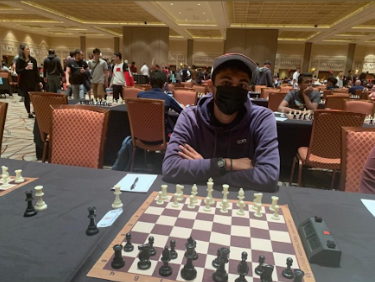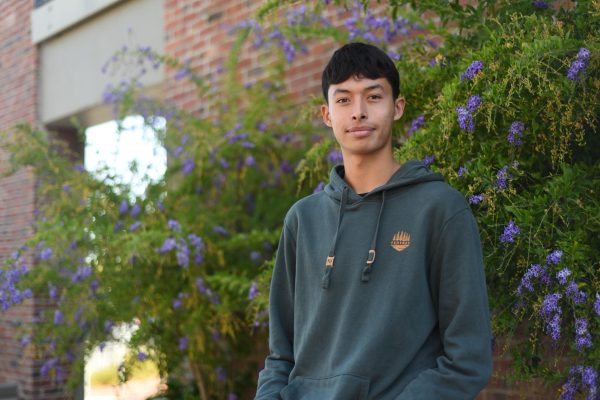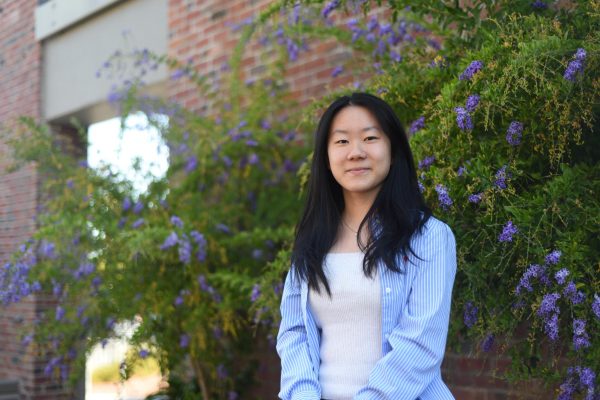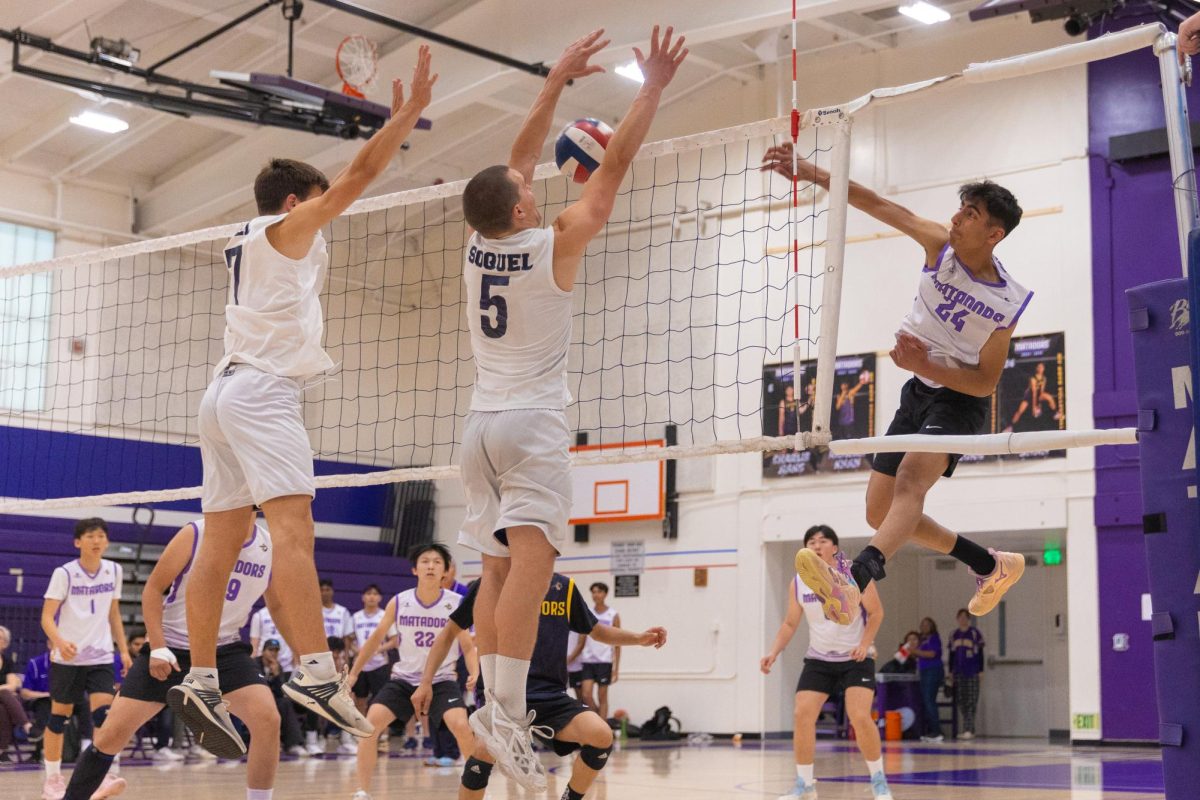EE: Hi everyone, my name is Ethan Eisler,
JL: And I’m Joyce Li.
EE: Welcome to Episode 18 of Time Out! Each episode, we dive into the sports scene here at Monta Vista and explore the journeys of athletes from various sports. In this episode, we are joined by senior Krishna Nathan who shares his journey in chess.
JL: How long have you been playing chess?
KN: I’ve been playing chess ever since I was five years old. So I guess that makes it 13 years now.
JL: What is your current title or ranking in chess?
KN: So I’m currently a national master, which is awarded by the United States Chess Federation.
JL: How did you achieve this rank?
KN: So I had to achieve the USCF rating of 2200, which I did around one and a half years ago. And after I got that, they awarded me the title.
EE: Can you tell us what USCF is?
KN: It stands for the United States Chess Federation, and it’s basically a Federation that runs tournaments and players. So basically, every player is given a rating, which tells how good their skill level is. A higher rating means a higher skill level. And, the rating system is managed by the USCF. They also give out titles like National Masters.
EE: How did you get into chess?
KN: There’s this player Magnus Carlsen. He’s known as the best chess player in the world. Back when I was four or five, he was upcoming going to the top player rankings. It was said that he had a really good memory. My parents were following him and they saw that I had similar memory characteristics to him, so they tried to get me into chess. That’s how I got into everything.
EE: When did you decide to pursue chess at a higher level and why?
KN: So when I started playing — when I was six years old — I really enjoyed the game, so that definitely made me want to put more time into it. Then, I started improving really fast. I made the top 100 list two years into playing, so after that, when I was at higher rankings for my age, I tried to pursue it and tried to go for age-level awards and get titles and things.
EE: What are some challenges you faced when learning to play chess and how did you overcome them?
KN: First of all, losing is really hard at first because you have to know how to deal with the emotions after. You can easily get discouraged from a loss and you can play worse and it’s very discouraging, so getting over losing is a big challenge. Also, chess involves a lot of learning from your own mistakes. So sometimes, if you’re upset from a loss, and you don’t want to learn from your own mistakes, it can hinder your skill level, so it involves a lot of tough decisions and a lot of choices to make sure that you can improve.
JL: What is your favorite and least favorite thing about playing chess?
KN: My favorite thing is that it’s such a complex game that you can find really cool combinations and moves and really beautiful things. Even if you play the game as long as me, I still learn cool things about the game every day. It’s also really fun. I just find it really fun to play because of how the game is, the dynamics and everything, and so that’s my favorite thing. My least favorite thing is losses. Losses hurt a lot in chess, even compared to team sports because in team sports, at least when you take a loss it’s kind of on the whole team, but in chess, everything is on you. So I guess losses, and then also sometimes, you can hit a wall, and it’s very hard to improve for long periods of time, so I guess that’s another thing that I don’t like.
EE: So how did you deal with hitting a wall and you don’t know how to proceed?
KN: I feel like the most important thing is you just have to keep having motivation. You just have to trust that even though your rating is not improving, you’re still improving, because the more games you play, you’re getting exposed to new situations and learning new things. So even if that might not be reflected in your rating, you’re still improving over time. And for me, whenever I hit walls, it’s almost like I’m at the same exact rating for an entire year almost. And then, I just kind of get a spike because of how much I’ve learned and I just lost at one tournament — that type of thing.
JL: What is your favorite moment playing at a chess tournament?
KN: I think there’s been a few but one that stands out is, I think in seventh grade, there was this tournament called the Barber Qualifier, which was a qualifier tournament. There was one for every state like there were two for California in NorCal and southern California and the winner of the tournament would be the representative that would be in another national tournament that was really big and prestigious. So I actually managed to win that tournament. That was the first tournament I had won in six years, and I think in the last game, right before I knew that I had the win sealed, that was really nice.
EE: Can you describe what it’s like playing at tournaments?
KN: There is a lot of pressure for results. It’s very quiet and it’s very tiring, especially in the United States because in other countries, they play one game a day, so players have time to rest, but here, they play two or three games a day, so it’s really tiring. And of course, there’s the same thing about losses hurting and wins being very rewarding. I just liked the experience because it’s just so much thinking and involvement with the game, and you can sometimes come up with really cool ideas.
EE: What kind of emotions do you feel when playing chess in a tournament that you don’t necessarily feel when you’re just playing chess by yourself at home?
KN: When I’m playing chess by myself at home, I usually play loud music in the background and play really fast, not really thinking and trying to have fun. In a tournament, it’s complete silence and there’s definitely a lot more pressure and a lot more stress. I kind of go through a wave of emotions. I start off feeling really scared and unsure and then, I get really scared from a move my opponent plays, and then after that, if my position becomes better I feel a warm feeling if I feel more confident. Towards the end, it’s more of extreme focus, so those types of mindsets aren’t really there when I’m playing at home.
EE: Do you look up to any specific chess players now?
KN: I don’t really have one specific inspiration, but I guess there’s this chess player Viswanathan Anand, who I really looked up to, not for any particular reason. It’s just that he was one of the first chess players or top-level chess players that I heard of, and I just looked up to him.
EE: Is there anything that you hope to learn from him?
KN: I mean, he’s kind of older. He’s pretty much retired at this point, but I guess I learned one thing that he said is, “Even though I might be getting worse over time because of my age, I still love playing the game. So I’m still gonna persevere.” So I guess that’s a good lesson, even if you notice external factors are getting worse, you should still try to be motivated and pursue goals for the game.
JL: Do you have plans for playing chess in the future?
KN: Yes, I do. So currently, I have the National Master title, which is only one of many titles. There’s the International National title and Grandmaster title. Those are very big goals for me now because they’re very hard to achieve. But, I think I’m still motivated to keep working. I still want to improve myself, so I think in the future I’ll definitely keep playing tournaments and try to improve myself and try to at least get to the international master title, If not the Grandmaster title.
EE: That’s it for Episode 18 of Time Out! Thank you so much to Krishna for joining us!
JL: I’m Joyce.
EE: And I’m Ethan.
JL & EE: Thanks for tuning in!
Music Credit: Lukembro – Affogato












